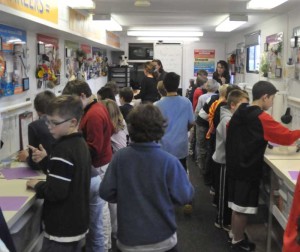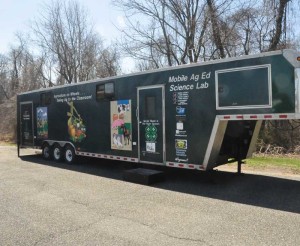Farm Bureau trailer spends a week at school, helps grow students minds
By Mike McGann, Editor, UnionvilleTimes.com

Fourth grade students at Hillendale Elementary School learn about making glue from cow's milk during a lesson in the Mobile Agriculture Education Science Lab, which visited Hillendale this past week.
PENNSBURY — While Pennsylvania’s farms have been feeding people for hundreds of years, a lot of people might be surprised to learn about some of the non-edible benefits of local agriculture.
Hundreds of local students at Hillendale Elementary School got a hands-on experience when the Mobile Agriculture Education Science Lab spent this past week at the school. Whether they were making a surprisingly sticky glue from cow’s milk or learning why soy beans make better crayons than petrochemicals, Hillendale students learned that farmers add a lot more to their lives than just tasty meals, not to mention some of the science behind everyday items.
The mobile trailer, sent around the state by the Pennsylvania Farm Bureau, is an educational lab and each class from first through fifth grades got an opportunity to enjoy one lesson. The school’s fourth graders all got a second lesson, as reenforcement for their upcoming Pennsylvania System of School Assessment (PSSA) science tests.
“It’s something I’ve hoped to do for some time,” Hillendale principal Steve Dissinger said.
The lesson plans are customized for the age groups, more basic information for students in first and second grades, mixed in with storytelling and elements of longer-term observation to reenforce lessons. As an example, one session, “Tops and Bottoms” highlighted plants we eat that either use the tops (leaves or fruits) or bottoms (potatoes), and students were able to plant both varieties and take them back to their classrooms to see how they grow over the coming weeks. Another lesson turns students into bees, learning to pollenate a field of flowers.

The Mobile Agriculture Education Science Lab spent an eventful week at Hillendale Elementary School.
Older students in grades three through five were able to do more hands-on experiments, working in groups of two to three. During a recent visit, fourth grade students were working together to make a household glue and then tested it in comparison to a well-known, commercially available “white” glue. Students were very intent on their work, and despite the fairly close quarters of the interior of the trailer, it was surprisingly quiet and lab-like.
Other experiments for the older students at Hillendale included lessons about using corn to make plastic and another on using soy as a base for crayons versus petrochemicals.
According to the Farm Bureau, the science curriculum taught in the mobile lab meets state Department of Education Science & Technology and Environment & Ecology standards and is endorsed by the state Department of Agriculture.
The experiments performed include equipment and supplies not readily available to classroom teachers and are of a nature that most teachers wouldn’t want to tackle in a traditional classroom setting.
Each science experiment is designed to emphasize a different aspect of agriculture, including Pennsylvania’s primary commodities, the environment, biotechnology, food and fiber, etc…Children work cooperatively to solve a problem as they form a hypothesis, collect data and draw conclusions.






